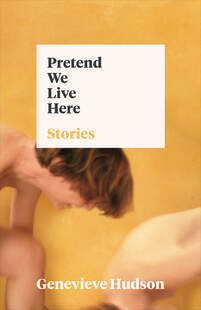Genevieve Hudson captures the comfortable in the uncomfortable. Her collection of short stories, Pretend We Live Here, centers on characters looking for home in places, in people, in their own bodies. No matter where her characters roam, readers are confronted with the violence inherent to existence through her sharp-edged but haunting, sometimes even joyful, prose. Violence is in the cells of many of Hudson’s characters, made compelling through their flaws and uncertainty. In “Adorno,” a lesbian fails to find redemption for sleeping with her sister’s fiancé by joining a group of vegan ecoterrorists. She quotes Hannah Arendt, “The sad truth is that most evil is done by people who never make up their minds to be good or evil.” That’s what makes you want to keep reading about the humans Hudson conjureds on the page. They want something and that something is hinted and pulled at, whether it be redemption, home, connection, or comfort in their own bodies, but their attempts or what they find is often violent. A girl seeks out a spiritual healer to tear a rotting tooth from her mouth. A genderqueer person dwells on the dysphoria of a sexual encounter as her body rots in the hospital. A lesbian tries to seduce a married woman, making her squirm under the attention. To want something, even not knowing what, is painful.
Another way in which Hudson places the reader in an intriguing unease is the uncertainty and fluidity around her character’s own identities. Hudson’s anthology is refreshingly diverse in sexuality and gender identities, but the sexuality and gender of the characters is often completely unclear. In many stories, the gender of the narrator remains unspecified. Other characters throw gender norms into question, like a straight woman named Ted or a love interest referred to as a possum. The ambiguity does not confuse the narrative, but confidently highlights the assumptions a reader makes. A piece of safety is loss when the characters slip out of your grasp, leaving a sharp paper cut as a reminder of what you thought you knew. The reader feels the same confusion and uncertainty that many of Hudson’s characters experience. Multiple stories explore how desire and identity can be jumbled and sometimes tumultuous. In “Too Much is Never Enough,” a transgender person looks back on their childhood and their crushing on and wanting to be like their male friend Mason: “I think of myself as Mason, who is actually a dead boy. There is something sick about that. About imagining yourself as a dead boy.” The narrator lays their confusion and pain of being too boyish in spirit to be a girl and too girlish in body to be a boy, shreds of identity sewn together, for the reader. Hudson explores the inherent discomfort of identities, whether the character is comfortable in their skin or not, but they never feel forced or like a token character. In their slippery and sometimes unclear nature, Hudson’s characters feel organic and fully realized, even if they aren’t sure what they want. Because of the strong sense of character, Hudson’s prose is brimming with cutting honesty. In “Cultural Relativism,” the narrator says of southern university she works at, “I will explain that we drink the violence in like water from the tap. We take big gulps of it that we think will nourish us until we’re made up of violence, until it’s in our very cells.” It is through the eyes of Hudson’s characters that we see the world and people around them, projecting their uncertainty, their discomfort, their hope onto the places and people they interact with. She pulls off a balancing act of comfortable discomfort. In “Transplant,” a woman sees danger everywhere through the eyes of her dead lover in the back of her skull. Hudson conveys paranoia through unnerving details like wondering if the waiter’s fork is a weapon and seeing shadows from behind, but yet Hudson can write, “I held them in my hand, two globules of wet heat, the same feeling and texture of as skinned grapes and heard them say: home.” While still unsettling, Hudson can flip a scene on edge to a small moment that captures the protagonist’s desperation and love for this person. All of Hudson’s stories take the readers from the most jarring experiences to those moments joy we catch in between through her prose. Through full but flawed characters and brutally honest prose, Pretend We Live Here is a collection of stories that expose a raw nerve at the intersection of home and the violence that is woven into the landscape of our lives.
0 Comments
Leave a Reply. |
Archives
July 2024
Categories
All
|
|
Glassworks is a publication of Rowan University's Master of Arts in Writing 260 Victoria Street • Glassboro, New Jersey 08028 [email protected] |
All Content on this Site (c) 2024 Glassworks
|


 RSS Feed
RSS Feed
